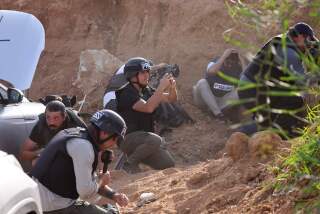Watchdog Wasn’t Leashed; It Was Playing Cheerleader : Panama: For the most part, American media fell right in step with the official applause and justifications for the invasion.
- Share via
Few Americans know that the U.S. government paid Gen. Manuel Noriega an estimated $1.2 million during the 1980s. Almost no one in our country knows that we bombed densely populated civilian centers like San Miguelito near Panama City or that hundreds of innocent Panamanian civilians were buried in mass graves last week. Nor do most of us know that Article 20 of the Charter of the Organization of American States provides that a nation’s territory “may not be the object, even temporarily, of military occupation or of other measures of force taken by another state directly or indirectly on any grounds whatever.”
Why are we the people in the dark about so many important facts relating to the invasion of Panama? It is because too much of the media surrendered its watchdog role, choosing, during the crucial first days after the invasion, to play mindless cheerleader for the U.S. government. When news first hit of the invasion and public opinion about it was still in the formative stage, the media for the most part fell hook, line and sinker for the official story.
Rather than examining the costs of the invasion in human, moral, legal and political terms, the media suspended critical judgment. Instead of asking the hard questions, too many members of the media acted as if the invasion were a Christmas party to which reporters were invited--and so they behaved as polite guests.
At the beginning, most television commentators simply assumed the morality of the invasion. We frequently heard reporters say: “We haven’t got him yet,” completely collapsing the distinction between the U.S. government and the American press. The press and the government were pictured as one team pursuing the criminal, Noriega. And the press pounced on every last juicy detail of Noriega’s purportedly bizarre personality, from his voodoo dolls to his estranged relationship with his wife.
Noriega is clearly a criminal. In the past, the desires of many to get him out went nowhere because of his long-standing relationship with the U.S. intelligence community. Truth is, he should have left power long ago. But there is a vast leap between this assumption and the conclusion that the military occupation of a sovereign nation and the killing of hundreds of innocent human beings is a proper response. Yet the press, which from the beginning should have been analyzing the logic and lawfulness of military intervention, spent too much time standing back and applauding.
In recent days, major media outlets have finally done a good job of noting the high number of Panamanian civilian casualties, calling attention to the U.S. attempt to demonize Noriega to justify its military actions and questioning whether our government served itself well by blasting rock music at the embassy where Noriega sought sanctuary. But alas, public opinion was formed on the early cheerleading , and now many Americans have turned their attentions to other news.
One of the obvious and too rarely asked questions is why the United States turned so suddenly and harshly against Noriega. After all, he was an ally for many years, during which time he was almost certainly dealing drugs.
Maybe we will get the answers if Noriega is ever prosecuted for his crimes. But in the meantime, there has been precious little analysis of the historical context of the invasion. Those of us who depend on the American media know more about the color of Noriega’s underwear than we do about what truly motivated our government to invade his nation.
There also was not enough discussion of the five other U.S. interventions in Panama this century nor of invasions of other sovereign countries in the region, like Nicaragua. Nor would one have any inkling from the press coverage that numerous other U.S. allies, including the Contras, have been implicated in narcotics trafficking. And there were few attempts by reporters or commentators to determine whether the invasion violated international charters or any of a number of other legal instruments.
But perhaps the most striking failure of all was the media’s decision not to explore the terrible costs of the invasion. There was far too little discussion of whether the loss of 27 young American lives was a reasonable price to pay for the ouster of our former ally. And the negative reaction to the invasion by most of the rest of the world was mentioned quickly and then passed over, as was the damage done to the major anti-drug conference in Colombia from which Peru has withdrawn.
It is important not to place all of the blame for the incomplete coverage on the media. Surely the government was tireless in trying to produce only enthusiastic coverage and head off serious questions. And when journalists tried to do their jobs, they ran into loud and angry reaction from the government. When most television networks showed live footage of the coffins of slain American servicemen arriving back in the United States at the same time the networks aired a live press conference with President Bush, the White House protested bitterly.
But the press must bear a large measure of responsibility itself. The military invasion of Panama continues to present dozens of troubling questions for the American people. But the media, with certain honorable exceptions, have failed to ask-- much less answer--many of them.
More to Read
Sign up for Essential California
The most important California stories and recommendations in your inbox every morning.
You may occasionally receive promotional content from the Los Angeles Times.













